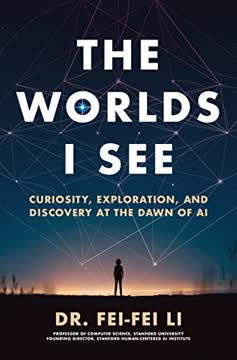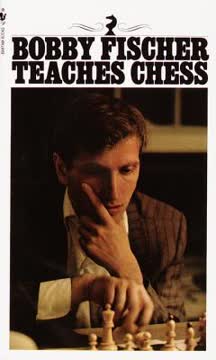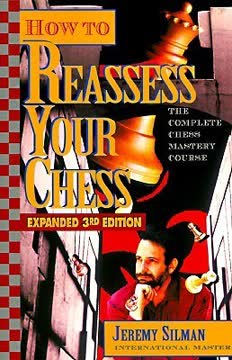Key Takeaways
1. Chess as a unique nexus of human intellect and AI development
Chess had a long-standing reputation as a unique nexus of the human intellect, and building a machine that could beat the world champion would mean building a truly intelligent machine.
Chess as AI benchmark. For centuries, chess has been revered as the ultimate test of human intelligence and strategic thinking. This perception made it a natural choice for AI researchers seeking to demonstrate machine intelligence. The game's complex yet rule-based nature provided an ideal platform for developing and testing AI algorithms.
Historical significance. From Alan Turing's paper chess machine to IBM's Deep Blue, chess has played a crucial role in the evolution of artificial intelligence. Each advancement in chess-playing machines represented a milestone in AI development, pushing the boundaries of what computers could achieve. The quest to create a machine that could defeat the world chess champion became a holy grail for AI researchers, symbolizing the ultimate triumph of artificial over human intelligence.
2. The evolution of chess machines: From Deep Thought to Deep Blue
Deep Blue was intelligent the way your programmable alarm clock is intelligent. Not that losing to a $10 million alarm clock made me feel any better.
Exponential progress. The development of chess machines saw rapid advancements from the early days of simple programs to sophisticated supercomputers like Deep Blue. This progress was driven by:
- Improved algorithms (e.g., alpha-beta pruning)
- Faster processors and specialized hardware
- Larger databases of chess games and openings
- Collaboration between computer scientists and chess grandmasters
Brute force triumph. Despite early hopes for machines that could mimic human-like thinking, the most successful chess computers relied primarily on brute force calculation. Deep Blue's victory over Kasparov in 1997 demonstrated the power of raw computational speed combined with vast databases, rather than true artificial intelligence as initially envisioned.
3. Human vs. Machine: Kasparov's historic matches against Deep Blue
I was the last world champion to win a match against a computer. Why don't those This Day in History calendars have a page for that!?
Landmark encounters. Kasparov's matches against Deep Blue in 1996 and 1997 marked a turning point in the history of human-machine competition. The 1996 match, which Kasparov won 4-2, showcased the rapid improvement in computer chess capabilities. The 1997 rematch, which Kasparov lost 3.5-2.5, became a global sensation and a watershed moment in AI development.
Psychological warfare. These matches were not just battles of intellect but also of psychology and endurance. Kasparov experienced unprecedented stress and confusion facing an opponent that:
- Didn't tire or show emotions
- Could be reprogrammed between games
- Played moves that seemed both brilliant and incomprehensible
The pressure led to Kasparov making uncharacteristic mistakes, including resigning a drawn position in game two of the 1997 match.
4. The psychological impact of playing against machines
I had started calming down, but this attempt at an olive branch only got my adrenaline surging again. Hadn't Tan himself told the New York Times that "the science experiment is over"?
Unique challenges. Playing against a machine presented unprecedented psychological challenges for Kasparov:
- Inability to read opponent's body language or emotions
- Constant questioning of the machine's capabilities and limitations
- Pressure of representing humanity against artificial intelligence
Emotional rollercoaster. The matches triggered intense emotional responses in Kasparov, from confidence to confusion to anger. This emotional turmoil affected his play and decision-making, highlighting the human element in high-stakes competitions against machines. The experience underscored the importance of psychological resilience in human-machine interactions, a lesson applicable beyond chess to various fields where humans work alongside AI.
5. IBM's aggressive pursuit of victory and its impact on the matches
IBM had made it clear they wanted to win at any cost. Would some sort of outside interference explain why Deep Blue had changed its character so radically?
Commercial motivations. IBM's approach to the matches was driven by commercial interests rather than purely scientific ones. Their aggressive tactics included:
- Refusing to provide game logs or details about Deep Blue's decision-making process
- Making last-minute changes to Deep Blue's programming
- Employing psychological tactics to unsettle Kasparov
Ethical questions. IBM's actions raised ethical concerns about fairness in human-machine competitions. The lack of transparency and the company's focus on winning at all costs undermined the scientific value of the matches. This approach highlighted the potential conflicts between commercial interests and the pursuit of knowledge in AI development.
6. The limitations of chess as a measure of artificial intelligence
Deep Blue was intelligent the way your programmable alarm clock is intelligent. Not that losing to a $10 million alarm clock made me feel any better.
Narrow intelligence. Deep Blue's victory demonstrated impressive computational power but not true artificial intelligence. Its success was based on:
- Brute force calculation
- Vast databases of chess games
- Specialized hardware
Beyond chess. The limitations of chess as an AI benchmark became apparent after Deep Blue's victory. Researchers realized that:
- Winning at chess didn't translate to general intelligence
- More complex games like Go would provide better challenges for AI development
- Real-world problems require more than just computational power
7. Human plus Machine: The future of chess and decision-making
My brainchild saw the light of day in a match in 1998 in León, Spain, and we called it Advanced Chess. Each player had a PC at hand running the chess software of his choice during the game.
Collaborative potential. Advanced Chess, where humans work alongside computers, represents a new paradigm in chess and decision-making. This approach:
- Combines human creativity with machine calculation
- Eliminates tactical blunders while emphasizing strategic thinking
- Produces a higher level of play than either humans or machines alone
Broader applications. The concept of human-machine collaboration extends beyond chess to various fields:
- Business strategy and decision-making
- Medical diagnosis and treatment planning
- Scientific research and data analysis
This model leverages the strengths of both humans and AI, potentially leading to better outcomes in complex problem-solving scenarios.
8. The democratization of chess through technology
It turns out that even world champions are outranked by defenders of humanity.
Widespread access. Technology has democratized chess in several ways:
- Online platforms allow players to compete globally
- Chess engines provide high-level analysis to amateurs
- Databases of games are freely available for study
Leveling the playing field. This democratization has led to:
- Emergence of young prodigies from diverse backgrounds
- Acceleration of chess skill development
- Reduction in the advantage of traditional chess powerhouses
The democratization of chess serves as a model for how technology can make specialized knowledge and skills more accessible in various fields, potentially leading to accelerated progress and innovation.
9. Lessons from chess for education and cognitive development
The world is changing too quickly to teach kids everything they need to know; they must be given the methods and means to teach themselves.
Skill development. Chess promotes critical cognitive skills:
- Strategic thinking and planning
- Pattern recognition
- Concentration and focus
- Decision-making under pressure
Educational implications. The chess model suggests broader educational reforms:
- Emphasis on problem-solving skills over rote memorization
- Integration of technology in learning processes
- Encouragement of creative thinking and adaptability
These lessons from chess can be applied to reform educational systems, preparing students for a rapidly changing world where adaptability and critical thinking are paramount.
10. The importance of human creativity and intuition in the age of AI
Humans don't learn a native language from grammar books, after all.
Complementary strengths. While machines excel at calculation and data processing, humans still possess unique cognitive abilities:
- Intuition and pattern recognition
- Creative problem-solving
- Emotional intelligence and empathy
Balancing act. The key to progress lies in:
- Leveraging AI's strengths while nurturing human creativity
- Using machines to augment human decision-making, not replace it
- Developing educational and professional practices that cultivate distinctly human skills
As AI continues to advance, it becomes increasingly important to identify and develop the uniquely human qualities that complement machine intelligence, ensuring that humans remain relevant and valuable in an AI-driven world.
Human development. Write a few sentences about how Kasparov suggests humans can prepare for the AI future:
- Embrace lifelong learning and adaptability
- Cultivate creativity and critical thinking skills
- Develop emotional intelligence and interpersonal skills
- Learn to work effectively alongside AI tools
- Focus on uniquely human abilities that machines cannot easily replicate
</instructions>
Last updated:
FAQ
What's Deep Thinking: Where Machine Intelligence Ends and Human Creativity Begins about?
- Human-Machine Interaction: The book explores the evolving relationship between human intelligence and artificial intelligence, focusing on chess as a key example.
- Kasparov's Experiences: Garry Kasparov shares his personal journey and experiences competing against IBM's Deep Blue, providing insights into the challenges and triumphs of facing a machine.
- Philosophical Themes: It delves into broader themes of creativity, decision-making, and the implications of AI in society, questioning what it means to be human in a technologically advanced world.
Why should I read Deep Thinking by Garry Kasparov?
- Unique Perspective: Kasparov offers a firsthand account of his historic matches against Deep Blue, providing insights not found in typical chess literature.
- Relevance to AI: The book addresses ongoing discussions about AI's role in society and its impact on human creativity, making it timely and relevant.
- Inspiration for Innovators: Kasparov's reflections on adapting to challenges posed by machines can inspire readers to embrace change and innovation in various fields.
What are the key takeaways of Deep Thinking?
- Human Creativity vs. Machine Calculation: Kasparov emphasizes the differences between human intuition and machine logic, particularly in chess.
- Collaboration Over Competition: He advocates for a future where humans and machines work together, enhancing each other's strengths through concepts like "Advanced Chess."
- Understanding AI Limitations: The book highlights AI's limitations in understanding context and making nuanced decisions, underscoring the importance of human insight.
What are the best quotes from Deep Thinking and what do they mean?
- “Challenge yourselves and you will challenge the world.”: A motivational call to action, encouraging readers to push their boundaries and embrace challenges.
- “If you can’t beat ’em, join ’em.”: Reflects Kasparov's shift from viewing machines as adversaries to seeing them as collaborators, emphasizing adaptation to technological advancements.
- “The highest art of the chess player lies in not allowing your opponent to show you what he can do.”: Highlights the importance of controlling the game and limiting the opponent's options.
How does Garry Kasparov describe the evolution of chess machines in Deep Thinking?
- Early Development: Kasparov outlines the initial attempts to create chess-playing machines, noting their reliance on brute force calculations.
- Technological Advancements: He details how improvements in hardware and software led to significant enhancements in machine play, including specialized chips and algorithms.
- Deep Blue's Impact: Kasparov reflects on his matches against Deep Blue, marking a turning point in human-machine relations and the culmination of decades of research.
What is "Advanced Chess" as mentioned in Deep Thinking?
- Concept Overview: Advanced Chess is a format where human players use chess engines as partners, combining human creativity with machine calculation.
- Experimentation and Results: Kasparov conducted experiments with Advanced Chess, observing innovative strategies and high-quality play resulting from human-machine collaboration.
- Future Implications: The concept serves as a metaphor for potential human-machine collaboration in various fields, leading to new opportunities and advancements.
How did Kasparov feel during his matches with Deep Blue?
- Shock and Disbelief: Kasparov experienced shock at Deep Blue's capabilities, especially after losing the first game.
- Frustration and Pressure: The pressure of the matches weighed heavily on him, leading to feelings of exhaustion and demoralization.
- Determination to Adapt: Despite challenges, Kasparov remained determined to adapt his strategies, recognizing the need to target Deep Blue's weaknesses.
What strategies did Kasparov use against Deep Blue?
- Anti-Computer Strategy: He employed quieter openings to avoid sharp tactical positions where Deep Blue excelled.
- Psychological Warfare: Kasparov used unexpected moves to unsettle Deep Blue, such as playing the Reti Opening.
- Adaptation and Learning: He adapted his approach based on Deep Blue's play, focusing on targeting its weaknesses and avoiding its strengths.
How did Deep Blue change between the first and second matches?
- Improved Evaluation Functions: Deep Blue's evaluation functions were upgraded, allowing it to play more strategically.
- Increased Speed and Power: Its processing power was doubled, enabling it to analyze more positions per second.
- Human-Like Moves: Deep Blue began to exhibit more human-like strategic play, surprising Kasparov with its understanding of positional factors.
How does Deep Thinking address the psychological aspects of playing against machines?
- Unique Challenges: Kasparov discusses the psychological tension of competing against a machine, which lacks human emotions and vulnerabilities.
- Impact on Performance: The presence of a machine can lead to over-calculation and second-guessing, affecting a player's decision-making process.
- Human vs. Machine Dynamics: The asymmetry of competition alters the traditional chess experience, creating a unique challenge for players.
What lessons does Kasparov draw from his matches with Deep Blue?
- Embracing Change: Kasparov emphasizes the importance of adapting to new technologies and challenges, advocating for innovation.
- Understanding Limitations: He learned about AI's limitations in creativity and intuition, recognizing the depth of human thought.
- Collaboration as Key: Kasparov concludes that the future lies in human-machine collaboration, leading to advancements in various fields.
What does Garry Kasparov believe about the future of AI and humans?
- Collaboration is Key: Kasparov advocates for a future where humans and machines collaborate rather than compete.
- Human Creativity Matters: He believes human creativity and intuition remain essential, even in an age of advanced AI.
- Cautious Optimism: While acknowledging AI challenges, Kasparov remains optimistic about technology enhancing human capabilities.
Review Summary
Deep Thinking explores Kasparov's famous chess matches against IBM's Deep Blue, offering insights into AI, chess, and human cognition. While some readers found it insightful and well-written, others felt it focused too heavily on chess or Kasparov's personal grievances. The book discusses the implications of AI for society, emphasizing the potential for human-machine collaboration rather than competition. Many reviewers appreciated Kasparov's perspective on technology and its impact on human creativity, though some found parts of the book less engaging or repetitive.
Similar Books








Download PDF
Download EPUB
.epub digital book format is ideal for reading ebooks on phones, tablets, and e-readers.







